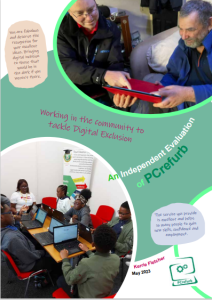A lot has happened in the three years since we were awarded a National Lottery Community Fund grant. PCrefurb has developed significantly in response to the impact of digital exclusion, not least during the Covid pandemic.
In the autumn of 2022, we commissioned an independent evaluation of the project. This has been undertaken by Kerrie Fletcher. Kerrie is a freelance consultant with over 20 years’ charity experience at a senior level as well as in frontline and board roles, in different organisations and different areas across the UK. The report is an interim evaluation of the five-year grant that was secured.


The evaluation report is based on: a review of project documentation and monitoring reports; surveys of individual beneficiaries, referral organisations and volunteers; interviews with staff, referral partners and service users; and observation visits to two refurbishment workshops. Evidence gathering for the evaluation took place during January-March 2023.
This blog is a summary of the findings of that evaluation, the full report can be read here.
Background
PCrefurb was established in 2018 to meet an identified gap in support for people who wanted, but could not afford, to access IT.
PCrefurb’s services address all three key elements of digital exclusion:
- Device poverty (not having or having access to suitable connected devices)
- Data poverty (lacking sufficient, private and secure mobile or broadband data to meet
- essential needs).
- Digital literacy (skills and knowledge to operate devices & to access and use the internet safely)
They do this through providing free digital devices, access to data, and digital skills training, working with a wide network of local partners across High Peak and Tameside to ensure they reach those most in need of support in their communities.

“The evidence shows that the services provided by PCrefurb are valued by beneficiaries, referral organisations and volunteers alike. The result is tangible benefits to beneficiaries’ employability, health, wellbeing & quality of life, financial position, skills & knowledge, and social connection.”
Activity
Between March 2020 & February 2023
771 individual beneficiaries:
- 504 received digital equipment only
- 157 received digital skills training only
- 110 received equipment and digital skills training
58 organisations received digital equipment
Equipment refurbished and distributed:
- 202 Desktop computers
- 587 Laptops
- 91 Tablets
- 70 Phones
- 170 Monitors
- 29 Peripherals
Total items: 1,149
267 individuals received Digital Skills Training from the Digital Wellbeing Project which started in September 2020.
866 digital skills training sessions provided.
More than 1,117 hours of training delivered.

Outcomes
The majority of survey respondents reported that using PCrefurb’s services had led to positive outcomes for themselves or for the people they referred to the service.
% reporting at least one positive outcome:
| Outcome sphere | Individuals | Organisations | Volunteers |
| Employment | 71% | 68% | 39% |
| Financial | 71% | 80% | N/A |
| Health, wellbeing & quality of life | 89% | 92% | 100% |
| Skills & knowledge | 86% | 88% | 91% |
| Social connection | 86% | 92% | 96% |
People’s experience of PCrefurb
98% of service users said staff were friendly and helpful
94% had received a prompt response
98% of those who received devices said they were in good working order
100% of volunteers felt they were well-prepared and clear what was expected of them;
91% felt the organisation listened to them
100% of volunteers felt valued and would recommend it to others
“Overall, 99% of all survey respondents were satisfied with their experience of PCrefurb.”

Conclusion
“The evidence suggests that PCrefurb has an effective delivery model that achieves real outcomes for people who are digitally excluded. The service is respected and valued by those who refer in to it, beneficiaries and volunteers alike. There are some suggestions for change in the surveys but overall the reported experience is almost unanimously positive. It tackles digital exclusion in a holistic way, tackling a range of issues. Through its network of trusted relationships with local organisations and agencies, it is able to reach those who are least digitally confident and most excluded. It tackles digital access by addressing both device and data poverty, providing free devices and connectivity to those who would otherwise be unable to afford to get online. It tackles digital literacy by providing community-based, flexible, personalised mentoring and support to help people navigate the digital world, to ‘meet them where they are at’ and use the internet in ways that matter to them.”
